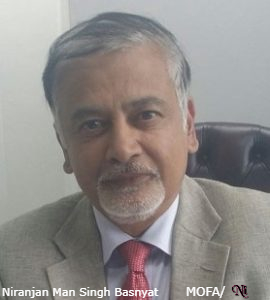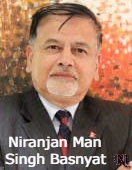Ambassador Dr. Niranjan Man Singh Basnyat
Kathmandu, Nepal
Background:
Japan was defeated in the Second Great War by Allied Powers. It surrendered on 14 August 1945 to the Allied forces after nuclear weapons were used against the civilian population of Hiroshima and Nagasaki on 6th and 9th August 1945.
Altogether 214 thousand people perished in these two islands due to this heinous act committed by the orders of American President Truman. Many thousands of people were injured and suffered from diseases l
ike cancer due to radiation. For many years there was no agricultural production. It was for the first time that deadly weapons were used in the world. It seemed that Americans wanted to test their new weapons on innocent human beings which they had produced less than just three weeks ago on 16 July 1945 after the explosion in Los Alamos, New Mexico. It was believed that America used nuclear weapons to threaten the then USSR, though Japan was already at the brink of surrender.
After this incident, the Constitution of Japan was promulgated on 3 May 1947 with the involvement of American experts led by the occupying Allied forces Supreme Commander General Douglas MacArthur. This Constitution replaced the Meiji Constitution which was promulgated in 1889. According to Article 9 of the constitution, Japan renounced the war. This Article declares and defines its international relations as follows:
“Aspiring sincerely to an international peace based on justice and order, the Japanese people forever renounce war as a sovereign right of the nation and the threat or use of force as means of settling international disputes. In order to accomplish the aim of the preceding paragraph, land, sea, and air forces, as well as other war potential, will never be maintained. The right of belligerency of the state will not be recognized.”
Since 1947, Japan progressed and gained tremendous economic growth with the parliamentary system of governance which was introduced in any Asian nation for the first time. The name of its parliament is Diet.
In the 1980s, Japan became the second largest economic power only behind the United States that provided it world prominence. Japan gained its global influence and focused its attention to enhancing better relations with neighbours and the US.
At the international arena, its objectives were to promote the growth of multilateralism and contribution to the development of underdeveloped countries of Asia and Africa. The Least Developed Countries (LDCs) like Nepal benefitted from the financial assistance of Japan over six decades. At present, Japan stands at the position of third economic power after China obtained the second position due to its commendable economic development in recent times.
Japan’s Foreign Policy Objectives:
The goal of foreign policy is to safeguard the interests of Japan and the security and prosperity of the Japanese people. The basic objectives for Japan’s foreign policy in the 21st century can be summed up as follows: a) Vision: Japan’s vision is to establish an international environment for building a world where people can count on a better future.” The twenty-first century should be “a century of hope” for the international community. Security and prosperity of Japan cannot be achieved without the more stable international politics and sustainable development of the international community. All the religions and cultures of the world must coexist.
b) Promotion of freedom, democracy and respect for basic human rights: These are the major principles of Japanese diplomacy which provided impetus to its development after the end of World War II. The Japanese model of economic growth has been widely accepted, shared and implemented throughout the world.
These principles can be used for ensuring a better future through sustainable development assistance, including for the elimination of poverty, combating global warming and climate change, and discrimination in world trade.
c) Globalization: Interdependence among the countries and globalisation can form a core basis of international development and a better future. In this context, Japan should play the role of a global player.
d) Japan should remain a reliable nation: Japan pursues its visions in the international community through its active and dynamic foreign policy. It strives for becoming a reliable country in international relations. It should not be always influenced by its past history.
e) Security and defence: Japan had signed the documents of security arrangements with the United States making it a member of Western allies. It is under the “nuclear umbrella” of the United States. Thus America has become a pillar of Japan’s defence policy. Japan adopted the democratic system of governance and it follows the policy of settling international conflicts by peaceful means. Japan is against the policy of proliferation of nuclear weapons and other weapons of mass destruction (Chemical and Biological weapons). Since the devastation in Hiroshima and Nagasaki in WW II, Japan has been a staunch supporter of anti-nuclear initiatives. It adhered to the “Three Non-Nuclear Principles” in 1967, banning the production and possession of nuclear weapons.
Japan’s position on Nuclear Disarmament:
Japan was the only victim of nuclear weapons, so we need to understand the Japanese views about the nuclear weapons and its possible use. Participating at the Tenth Review Conference of NPT (Non-Proliferation Treaty) in August this year, Prime Minister of Japan, Mr. Fumio Kishida warned the international community about the possibility of use of nuclear weapons by Russia against Ukraine in view of the threat by Russian President Putin recently. President Putin’s statement has triggered the worldwide concern of another catastrophe which is real.
Prime Minister Kishida further said that as he belongs to Hiroshima, he would like to urge the international community to work steadily for a world without nuclear weapons, however the path may be harder one. He stated that the NPT regime, which is the cornerstone of nuclear disarmament and non-proliferation, can only bring about international peace and security. Similarly, there is an urgent need to accelerate the negotiations on the FMCT (Fissile Material Cut-off Treaty). The proposed Treaty would ban the production of the two main ingredients of nuclear weapons i.e. highly-enriched uranium (HEU) and plutonium. He also called for the implementation of the “Hiroshima Action Plan.” However, it was surprising to note that he refrained from mentioning the Treaty on the Prohibition of Nuclear Weapons (TPNW), which already entered into force on 22 January 2021. This landmark Treaty has been ratified by 68 member states of the United Nations. Other 26 member states including Nepal have signed it.
Prime Minister Kishida also mentioned another possible nuclear test by North Korea and said that Japan will work with the international community for the negotiations with North Korea.

Japan is a peaceful country in the world. It firmly believes in the principles and purposes of the United Nations Charter and makes efforts to promote rule-based international order under the UN, thereby providing impetus to world peace and stability.
Japan pursues the policy of economic development in the international community. Japan is a powerful member of the G20, OECD and Japan-ASEAN Agreement. Japan’s active participation through OECD in economic cooperation has fostered development projects in many countries. It supports the just cause of developing countries in collaboration with other developed countries in the form of South-South and Triangular Cooperation. In addition, Japan International Cooperation Agency (JICA) has been assisting in several cooperation activities with the developing countries including LDCs like Nepal on the matters of mitigating Climate Change and natural disasters, attaining SDGs by 2030 under Addis Ababa Action Agenda (AAAA). Japan recognizes the important role of private corporations and civil society. Many developing countries have progressed remarkably in poverty alleviation which is reflected in their reduced rate of poverty and the enhanced Human Development Index.
Japan’s position on other major International Issues:
The Prime Minister of Japan Mr. Kishida, outlining the major orientation of Japanese foreign policy, stated that we, in the United Nations Organisation, are still witnessing the devastation in Ukraine, in his address to the 77th session of the United Nations General Assembly in September. The founders of the UN were determined to not repeat the scourge of war. All member states should unite and maintain international peace and security so that the people can enjoy economic and social development. He further said that Russia’s aggression against Ukraine has shaken the foundations of the United Nations. He emphasized on the need to strengthen the organization through the reforms across the board, including the Security Council. The credibility of the UN is at stake with the aggression of a permanent member of the Security Council. Other points he mentioned were as follows:
i) Need to promote rule of law in the international community. ii) Promotion of human security concepts in the new era. iii) Strengthening of the UN, inter alia, functions of disarmament and non- proliferation. iv) Actions towards reform of the Security Council, particularly its dysfunctionality. v) The Summit of the Future scheduled for 2024 is a good opportunity to discuss the entire reform agenda of the UN functions; vi) Japan has been playing an active role in various fields in cooperation with other countries, including efforts towards the realization of a “Free and Open Indo- Pacific”.; vii) “The United Nations does not exist solely for the benefit of the great powers.
The United Nations exists for the entire international community, founded on the principle of the sovereign equality of all Member States. It exists to fulfill the claims of not just the powerful and the loud states but also of the voices that are often unheard but are equally legitimate.” (Quoted from the text of his address).
viii) Japan’s policy remains unchanged regarding relations with DPRK ( Democratic People’s Republic of Korea) which is reflected in the Japan-North Korea Pyongyang Declaration signed two decades ago.
Conclusion:
In view of the above, it is understood that Japan is committed to the maintenance of international peace and security as per the Charter of the United Nations. Though it cannot have a strong military as per its constitutional provisions, Japan has started taking part in the Peace-keeping operations of the UN since its participation in Cambodia in 1992. Japan is against the use of all types of force and promotes the rule of law in the international community. It believes in the peaceful settlements of all disputes. Whether big or small or powerful, every member state’s views should be well respected and well taken. Thus Japan is a prominent international power which is working continuously for world peace, and contributing to economic and social development of all countries.
References:
The Constitution of Japan, 1947.
Based on the proposal entitled “Challenge 2001-Japan's Foreign Policy toward the
21st Century submitted by a panel of seven Professors of different Universities in
Japan to the Foreign Minister Masahiko Koumura, January 1999.
Address by Prime Minister Fumio Kishida, Tenth Review Conference of NPT,
August 2022, UN, New York.
Address by Prime Minister Fumio Kishida to the 77th session of the United Nations
General Assembly, September 2022, New York.
